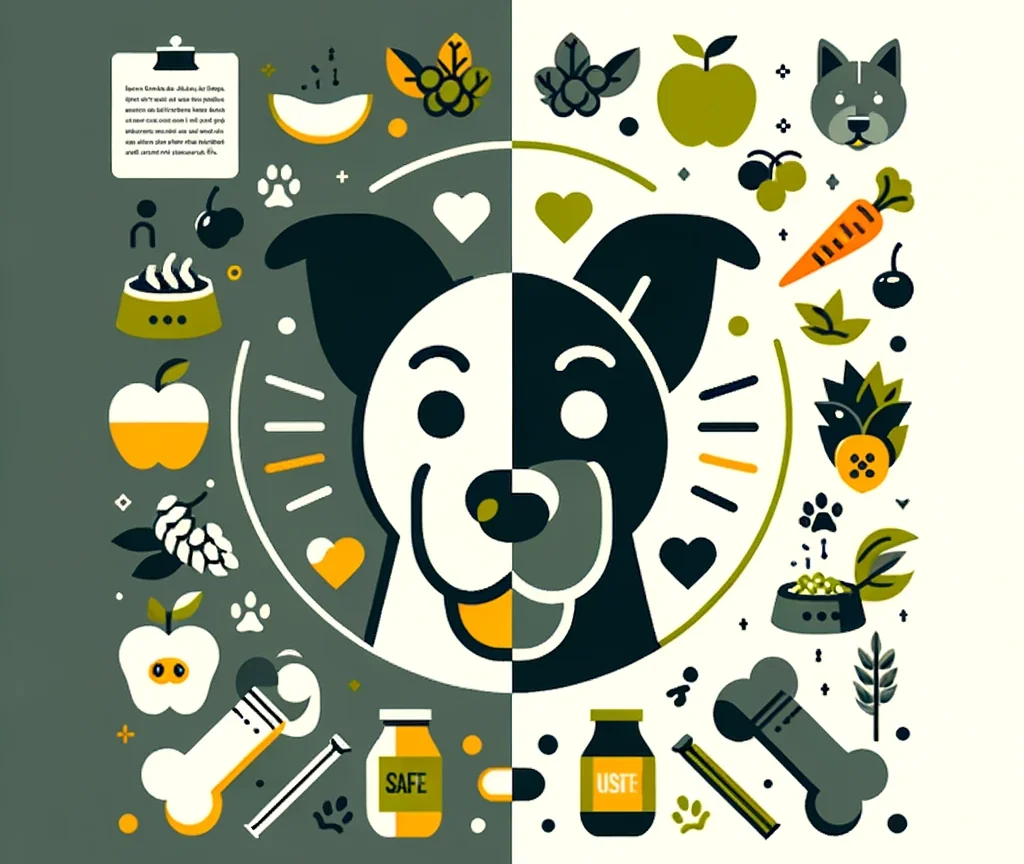You’re there chopping veggies for dinner, and those puppy dog eyes are giving you the ultimate guilt trip. Sharing is caring, but when it comes to our fur babies, not all human food is created equal. This blog post will serve up the sizzling facts, helping you navigate the do’s and don’ts of your dog’s diet. By the end, you’ll be a pro at discerning which treats are tail-wags of joy and which are silent alarms.
Key takeaways:
- Stick to dog-safe snacks like carrots, plain cooked chicken, and seedless watermelon; avoid grapes, onions, and chocolate to prevent serious health issues.
- Always cook meat and fish thoroughly before sharing with your canine pal, and stay clear of bones and high-fat meats like pork.
- Consult reliable resources like the ASPCA Animal Poison Control Center and your vet to confirm the safety of human foods for dogs.
Hey there, dog lovers! Ever found yourself munching on a snack and caught those big puppy eyes staring up at you? You’re not alone! We’ve all been there, and it’s tempting to slip our furry friends a little treat. But before you do, let’s chat about what’s safe to share with your tail-waggin’ buddy.
Safe Snacks for Dogs:
– Carrots: A crunchy, vitamin-rich choice that’s good for their teeth.
– Apples: Just make sure to remove the seeds and core before serving.
– Plain Cooked Chicken: Great for extra protein, just skip the seasoning and bones.
– Green Beans: A low-calorie snack that’s also full of fiber.
– Pumpkin: Plain, canned pumpkin is a go-to for fiber and can help with digestive issues.
– Peanut Butter: Opt for unsalted and xylitol-free versions—a hit with most pups!
– Watermelon: Seedless and rind-free, it’s a hydrating treat on hot days.
Remember, moderation is key, and what may be a tiny snack for you could be a big deal for a smaller dog. Treats should only make up a small portion of their diet, so keep it occasional and you’ll be golden.
Are There Any Fruits and Veggies to Avoid?
We’ve covered the green light treats, but some fruits and veggies could spell trouble for your four-legged friend.
Foods to Avoid:
– Grapes and Raisins: Can cause kidney failure, even in small amounts.
– Onions and Garlic: These can lead to anemia by destroying red blood cells.
– Avocados: Contain persin which can be toxic to dogs in large quantities.
– Cherries: The pits contain cyanide, and the fruit can lead to intestinal blockages.
– Mushrooms: Some varieties are poisonous to dogs, best to avoid them altogether.
Watch out for warning signs like vomiting, diarrhea, lethargy, or abnormal behavior. If you suspect your pooch snacked on something they shouldn’t have, contact your vet pronto.
Can My Dog Eat Dairy Products?
Diving into the dairy debate, let’s churn through the facts. Many dogs can handle a bit of dairy, but others may turn up their noses due to tummy troubles afterward. Dogs, like some humans, can be lactose intolerant, meaning they have difficulty digesting lactose in milk.
Safer Dairy Options:
– Plain Yogurt: Often tolerated better due to live cultures, which can aid in digestion.
– Cottage Cheese: It’s lower in lactose and generally easier on the belly.
When it comes to milk, cheese, and the wide array of dairy, remember that less is more. Watch for signs of digestive upset like gas or diarrhea, and when in doubt, skip the dairy aisle and stick with dog-specific treats.
Alright, with those tidbits of info, you’re well on your way to savvy snacking with your sidekick. But hold your horses; we’re not done yet! Your pup’s health and happiness are always the top priority, so let’s keep the good times (and the right treats) rolling! Keep an eye out for our upcoming sections where we’ll dig even deeper into keeping your buddy both happy and healthy.
How About Sharing My Meat and Fish with My Canine Friend?
When it comes to sharing your protein-packed pals like meat and fish with your furry friend, there are some ground rules to keep everyone happy and healthy. After all, who can resist those puppy dog eyes begging for a taste of your dinner?
Meat: A Carnivore’s Delight… with Caveats
Dogs, by nature, are meat-eaters. So, giving them meat seems like a no-brainer, right? Well, mostly yes—but let’s cook it first. Raw meat can harbor bacteria like Salmonella and E. coli, which can be a hassle for both you and your pooch. Stick to fully cooked meats that are free of seasonings, sauces, and onions—which can be toxic for dogs. Also, ensure that the meat is boneless; those splintery bits can be a choking hazard or cause internal injury.
Now, here’s the skinny on specific meats:
- Chicken: Cook thoroughly and remove all bones.
- Beef: Lean cuts served plain and cooked are a healthy option.
- Turkey: Also fine when cooked and de-boned. Watch out for excess skin and fat.
- Pork: This one’s a bit fatty, so keep portions small and infrequent.
Fish Tales: The Good and the Scaly
Fish can be a great source of omega-3 fatty acids and protein for your dog. Nevertheless, always cook fish to kill any harmful parasites and bones. Here’s the catch:
- Salmon: Make sure it’s thoroughly cooked to avoid salmon poisoning disease—trust me, it’s a thing.
- Tuna: Go for the canned-in-water variety, drained and served in small portions due to higher mercury content.
- Sardines: These are usually safe in moderation because they contain less mercury.
Oh, about those raw diets…
Some pet parents swear by raw diets for dogs, the BARF diet (Biologically Appropriate Raw Food), being a notable example. However, research is still on the fence, and the FDA does not recommend feeding raw foods to pets due to contamination risks. If you’re considering this path, it’s wise to consult with a veterinarian nutritionist to weigh the pros and cons.
Is It Ever Safe to Give Dogs Sweets or Baked Goods?
Sharing a moment over a sweet treat with your dog seems like a bonding experience, but in reality, it’s a bit of a minefield. Dogs process sugars much differently than we do, and too much can lead to obesity, dental problems, and even diabetes. Plus, some common ingredients in sweets and baked goods can be dangerous—or even deadly—to dogs.
Let’s zero in on the main culprits:
- Xylitol: This sugar substitute, found in many sugar-free products, can cause acute toxicity in dogs, leading to liver failure and hypoglycemia—in short, it’s a huge no-go.
- Chocolate: This beloved dessert contains theobromine, which dogs cannot metabolize effectively. Eating chocolate can lead to heart issues, tremors, and seizures in dogs.
- Raisins and grapes: Even in baked goods, these are toxic and can lead to kidney failure in dogs.
So, while those puppy dog eyes might be hard to resist, stand firm for the sake of your four-legged companion’s health. If you want to indulge your pup, consider dog-friendly treats that will let them join in the fun without the health risks.
How Do I Know If a Food Item Is Dangerous for My Dog?
Sorting out what’s a treat and what’s toxic can look like a tricky business, but with the right resources and a dash of awareness, you’ll be an expert in no time. Here’s some real talk on keeping your dog safe at snack time.
-
Do Your Homework: Before sharing your snack, do a quick internet dive to ensure it’s safe for Fido. Websites like the ASPCA’s Animal Poison Control Center offer valuable insights into what’s safe.
-
Consult the Pros: When in doubt, ring up your vet. They’ve got the scoop on canine nutrition and can help make sense of conflicting info you might find online.
-
Label Reading: Become a label detective. Ingredients like garlic or onion powder, caffeine, and alcohol are common in human foods but harmful to dogs.
A tidbit that’s often overlooked is the way different foods interact with your dog’s specific health concerns. For instance, if your dog has a history of pancreatitis, even safe foods like lean meats should be given with caution due to their fat content. Always consider your dog’s health history when sharing your grub.
Remember, whenever your canine companion gets into something they shouldn’t, time is of the essence. Have the number for the pet poison hotline or your vet handy for quick action. And in our digital age, don’t overlook the wealth of apps available which can provide instant guidance on pet-safe foods and potentially toxic substances.
By being mindful of your dog’s diet and armed with the right knowledge, you can ensure they stay by your side for all of life’s adventures— healthy, happy, and well-fed.
Alex, a passionate animal lover, has experience in training and understanding animal behavior. As a proud pet parent to two dogs and three cats, he founded AnimalReport.net to share insights from animal experts and expand his knowledge of the animal kingdom.





